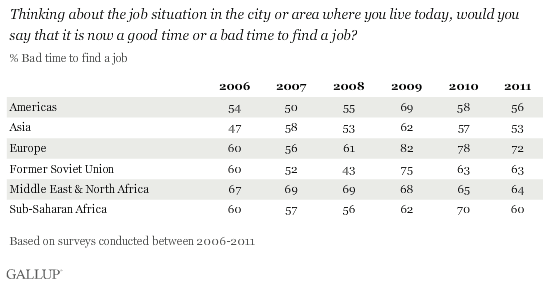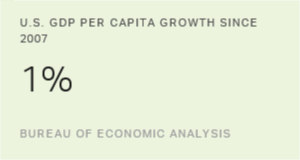This article is the second in a series exploring worldwide perceptions of pre- and post-recession local job availability.
WASHINGTON, D.C. -- Worldwide, people were just as gloomy about local job prospects in 2011 as they were in the years leading up to the global economic crisis, with one in three saying it was a good time to find a job. While this trend reveals a dismal jobs outlook before the recession, it also shows people's views are returning to "normal" after bottoming out in 2009.
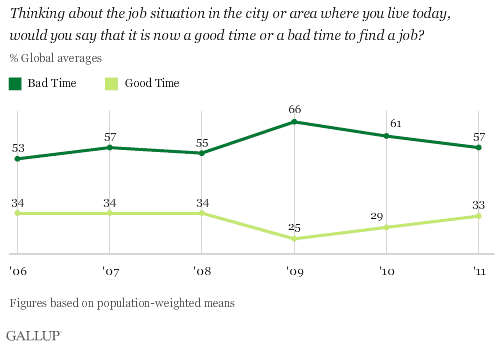
Positivity about local job markets has almost fully rebounded to pre-recession levels everywhere - except in Europe, where the percentage saying it was a good time plummeted to 10% at the height of the global economic crisis in 2009. Europeans continue to be the least optimistic worldwide about finding a job where they live.
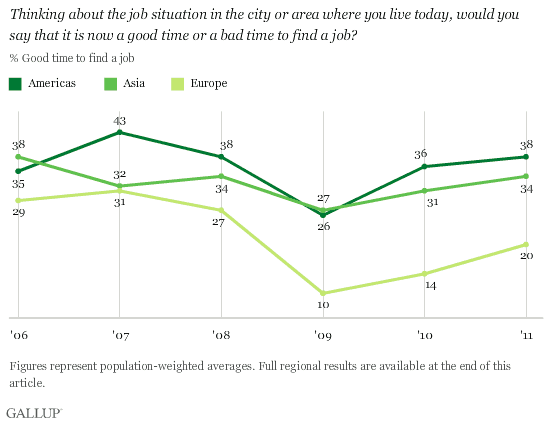
Jobs Outlook Brighter in Some Developing Countries
Seven of the top 10 most optimistic spots across the entire timespan from 2006 through 2011 are developing countries, led by the Philippines, where an average of 65% said it was a good time to find a job despite unemployment rates between 7.3% and 7.9% during this period.
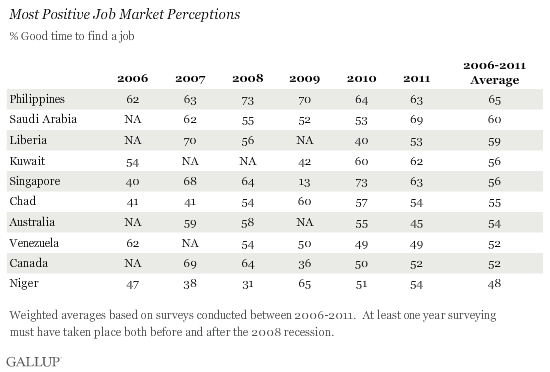
Others in the top 10 over the pre-, during, and post-recession period include the oil and mineral-based economies of Saudi Arabia, Kuwait, Venezuela, and Niger. The natural resource boom has also benefitted Canada and Australia with global demand soaring for Canada's tar sands oil and Australia's extensive reserves of energy and minerals, including coal, natural gas, iron ore, copper, and gold.
Countries Struggling Before Crisis Face More Difficulty Rebounding
Residents in economically hard-hit eastern and southern European countries have been among the most negative about their local job markets between 2006 and 2011. Portugal and Greece were struggling with sluggish employment markets even prior to the recession with 68% in 2007 saying it was a bad time to find a job in Greece, and 79% in Portugal saying the same in 2006.
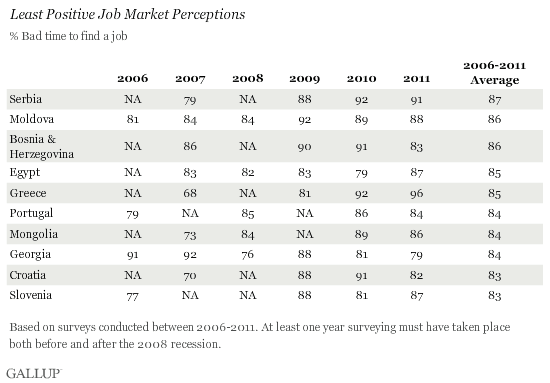
Significant majorities in Egypt were pessimistic on local job prospects, with a peak 87% saying it was a bad time to find a job in 2011. While positive perceptions have fallen since the ouster of former President Hosni Mubarak, Egyptians have long struggled with stagnant job growth, despite a relatively strong average GDP growth rate of 6% between 2006 and 2010.
Biggest Economies Had Negative Perceptions Before Recession
Even residents of the world's biggest economies were more negative than positive about finding a job in the area in which they lived between 2006 and 2011.
In the post-recession world since 2009, Brazil and Germany are the only leading economies to have majorities or pluralities of their residents say it was a good time to find a job. Majorities in Brazil in 2010 (53%) and 2011 (54%) were positive, in line with the country's exceptional 7.5% GDP growth rate in 2010 and with Brazil overtaking Great Britain as the world's 6th largest economy in 2011. Germany's leap in positivity from 2010 (22%) to 2011 (48%) could be attributed to 2011 being a record year for exports and residents in the workforce in that country.
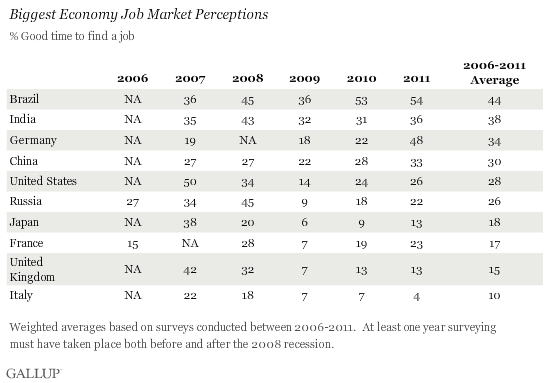
Like Greece and Portugal, France and Italy have long struggled with stagnant labor markets pre-dating the global financial crisis. Fifteen percent of the French believed it was a good time to find a job in the area where they lived in 2006, followed by Italy's dim 22% in 2007. While France has made post-recession gains, Italy has continued its slide into negativity, posting a near-universal belief that it was a bad time to find a job in 2011.
Implications
While the global economic crisis put a spotlight on the worldwide struggle to find jobs, Gallup found that ingrained pessimism existed before the crisis and that a struggling global economy merely exacerbated this problem. Counter-intuitively, while residents worldwide were still strongly pessimistic in 2011, the finding that pessimism has declined to pre-recession levels, and may decline further, could be an indicator that some degree of confidence is returning in many economic markets.
While jobs pessimism may be an economic "norm," world citizens' inherent negativity about their local job prospects may be contributing to the sluggish global economic recovery.
Leaders should monitor these perceptions closely, as economic negativity reduces certainty, encourages savings over market expansion, creates bear markets, and can contribute to stagnant job growth.
For complete data sets or custom research from the more than 150 countries Gallup continually surveys, please contact us.
Survey Methods
Results are based on telephone and face-to-face interviews with approximately 1,000 adults per country, aged 15 and older, conducted in 115 countries and areas that were surveyed at least once before and after the global economic crisis. To be included in the analysis, the country needed to have at least four years of data. For results based on the total sample of national adults, one can say with 95% confidence that the maximum margin of sampling error ranged from a low of ±3.5 percentage points to a high of ±4 percentage points. The margin of error reflects the influence of data weighting. In addition to sampling error, question wording and practical difficulties in conducting surveys can introduce error or bias into the findings of public opinion polls.
For more complete methodology and specific survey dates, please review Gallup's Country Data Set details.
